Having experienced many of the sorrows that Brian talks about in this sermon, I can’t commend his wisdom enough. Aspiring pastors would do well to note what he says about the initial two-year period.
Category Archives: Pastoral Ministry
Preachers as Parents
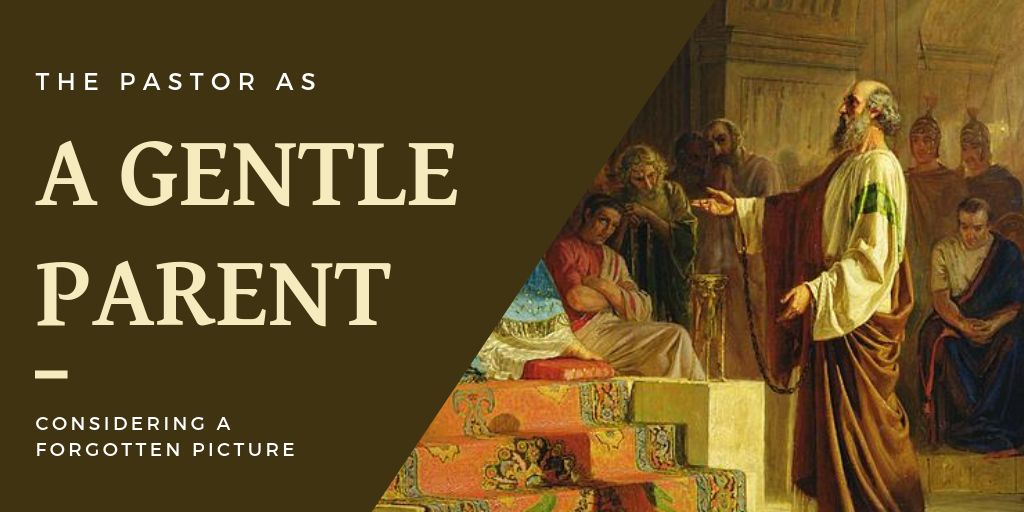
I’ve been meditating on the various word pictures used of preachers in the Bible. One of my favorites is probably the most-neglected portrait: the preacher as a parent. We know from Paul’s writings that gospel ministers function in a fatherly and motherly way to the congregation. Consider what Paul says in 1 Corinthians 4:14–21:
I do not write these things to make you ashamed, but to admonish you as my beloved children. For though you have countless guides in Christ, you do not have many fathers. For I became your father in Christ Jesus through the gospel. I urge you, then, be imitators of me. That is why I sent you Timothy, my beloved and faithful child in the Lord, to remind you of my ways in Christ, as I teach them everywhere in every church. Some are arrogant, as though I were not coming to you. But I will come to you soon, if the Lord wills, and I will find out not the talk of these arrogant people but their power. For the kingdom of God does not consist in talk but in power. What do you wish? Shall I come to you with a rod, or with love in a spirit of gentleness?
A text that has often encouraged me through the trials of pastoring has been Galatians 4:19, which says, “My little children, for whom I am again in the anguish of childbirth until Christ is formed in you!” The pains of spiritual childbirth plague the ministry—at least they should. Our aim is to present every member mature in Jesus Christ (Col. 1:28). Spiritual grow is a marathon, not a sprint. And so, we agonize (see Col. 1:29) as a mother bears children.
Another text we should often remember is Paul’s word in 1 Thessalonians 2:5–12:
For we never came with words of flattery, as you know, nor with a pretext for greed—God is witness. Nor did we seek glory from people, whether from you or from others, though we could have made demands as apostles of Christ. But we were gentle among you, like a nursing mother taking care of her own children. So, being affectionately desirous of you, we were ready to share with you not only the gospel of God but also our own selves, because you had become very dear to us. For you remember, brothers, our labor and toil: we worked night and day, that we might not be a burden to any of you, while we proclaimed to you the gospel of God. You are witnesses, and God also, how holy and righteous and blameless was our conduct toward you believers. For you know how, like a father with his children, we exhorted each one of you and encouraged you and charged you to walk in a manner worthy of God, who calls you into his own kingdom and glory.
Preachers are spiritual parents to the flock. We are to bring up God’s children in the Lord’s discipline and instruction. Christ has delegated authority to us that we might mold His people into His image.
As with the other word pictures for preaching, there are many sound implications we can make from this reality of the preacher as a parent. Let us focus on the one Paul emphasized: because the preacher is a parent, he must be gentle. Tenderness is the sanctified tone of a gospel ministry.
George Bethune, a preacher in the Dutch Reformed Church in New York, wrote in 1839, “Perhaps no grace is less prayed for, or cultivated less than gentleness. Indeed it is considered rather as belonging to natural disposition or external matters, than as a Christian virtue; and seldom; do we reflect that not to be gentle is sin.” Bethune’s words still ring true one hundred and eighty years later. Let us yearn for God to give us more gentleness in the ministry!
We should also consider Christ on this point (2 Tim. 2:8; Heb. 3:1); . We find Jesus occasionally burst out in rebuke or cry out in correction. His harshest words were always for professing believers full of pride and self-righteousness. But the air in which his ministry moved was that of gentleness. A bruised reed he did not break, a flickering flame he did not quench. It’s why Paul can command in the Corinthians in 2 Corinthians 10:1 Paul exhorts them by “the meekness and gentleness of Christ.” This is even what Jesus said of Himself in Matthew 11:29, “Learn from me, for I am gentle and lowly in heart.”
Paul is telling us it matters not only that the Lord’s servant proclaims the truth, but also how he preaches the the True One. Will anyone profit long-term from a ministry that tends to be angry and hard? It’s doubtful. We at least have no biblical reason to expect such a ministry will sustain spiritual fruit. But a ministry of gentleness and tenderness has great reason for hope.
The First Thing to Study
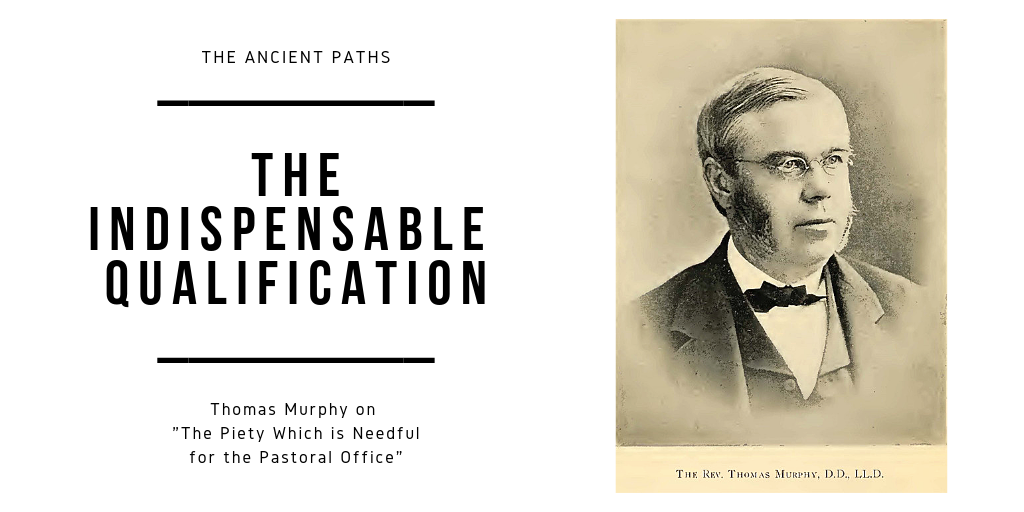
Thomas Murphy (1823–1900) was an Irish-American Presbyterian who pastored Frankford Presbyterian Church from 1848–1885. He trained for the ministry under the brilliant men at Princeton Theological Seminary. The professor that left an indelible mark on Murphy was Archibald Alexander. Murphy especially loved Alexander’s lectures on Pastoral Theology. Murphy took “copious notes” of almost everything he heard Alexander say about “the character, duties and responsibilities of the pastoral office.” Eventually, Murphy turned them into an excellent, yet all-too-neglected 1877 book Pastoral Theology: The Pastor in the Various Duties of His Office.
If you’re in ministry and haven’t read it, I’d encourage you to work through Murphy’s manual. You don’t even have to spend a penny for his thoughts!
A Significant Silence Today
Maybe I’m cynical. Or maybe I’m not listening to the right voices. But I keep asking, “Who today calls for pastoral holiness with the earnestness of Christ and his apostles?” You need only turn to John 15:4–5, 1 Timothy 4:7–16, and 2 Timothy 2:20–21 to see how holiness is the central concern for Christ’s ambassadors.
I assume one reason is that we’ve overemphasized contextualization, entrepreneurial skills, and worldly rhetoric in recent decades. Wondering if God’s word is sufficient God’s word, we’ve baptized cultural practices and imported them into the ministry.
You can also pay attention to the popular platforms of the most popular ministers. Each one has “their thing”: healthy churches, radical missions, confessional theology, and racial reconciliation. These are all good and necessary. But who is the person that is relentlessly and winsomely calling gospel ministers back to the things of first importance: knowing the love of Christ and returning love to Christ?
Perhaps we can’t name such a person because there’s little interest in the priority of piety. Could it be that we’ve cultivated churches that are skeptical about passionate pleas for Christ-centered, Spirit-powered godliness? Perhaps many church members—and church leaders—are more excited about becoming a huge, growing congregation than about hearing Christ from a holy, maturing minister. Yet it’s the latter reality that God has decreed an ordinary means of saving sinners and sanctifying saints (see Rom. 10:17; 1 Tim. 4:15–16).
Let us together begin to trod on the ancient paths.
It Used to Matter
YHWH spoke in Jeremiah 6:16, “Thus says the Lord: ‘Stand by the roads, and look, and ask for the ancient paths, where the good way is; and walk in it, and find rest for your souls.’” Give us, I say, the ancient directions that lead to life. Show us, I plead, the old paths that point us to Christ.
Thomas Murphy knows the way. And we should listen carefully.
Chapter two of his Pastoral Theology is titled, “The Pastor in the Closet: The Piety Which is Needful for the Pastoral Office.” His opening salvo about spirituality is tremendous—and needed. Here’s what he says:
It should be laid down as our first principle that eminent piety is the indispensable qualification for the ministry of the gospel. By this is not meant simply a piety the genuineness of which is unquestionable, but a piety the degree of which is above that of ordinary believers. It is meant that there should be a more thorough baptism of the Holy Ghost, a more absolute consecration of all the powers and faculties to the service of God, a more complete conformity to the likeness of the Lord Jesus, a greater familiarity with the mind of the Spirit, a nearer approach to the perfect man in Christ Jesus, in those who take upon them the privileges and the responsibilities of the pastor, than are commonly expected even in true Christians. The pastor should not be satisfied with reaching the general standard of spirituality. He has devoted himself to a high and holy office to which he believes himself called, and hence he has need of a very high tone of piety. As a minister appointed to serve in the sanctuary and wait upon souls, how deep should be his humility. His great aim is to save men, and it will not therefore suffice for him to have merely the ordinary sympathy with the suffering and the lost. He is to be a leader in the spiritual host of God; must he not go before others in spiritual attainments?
Do you think he’s too earnest? Does he demand too much? I think he’s got it quite right.
14 Reasons for Pastoral Piety
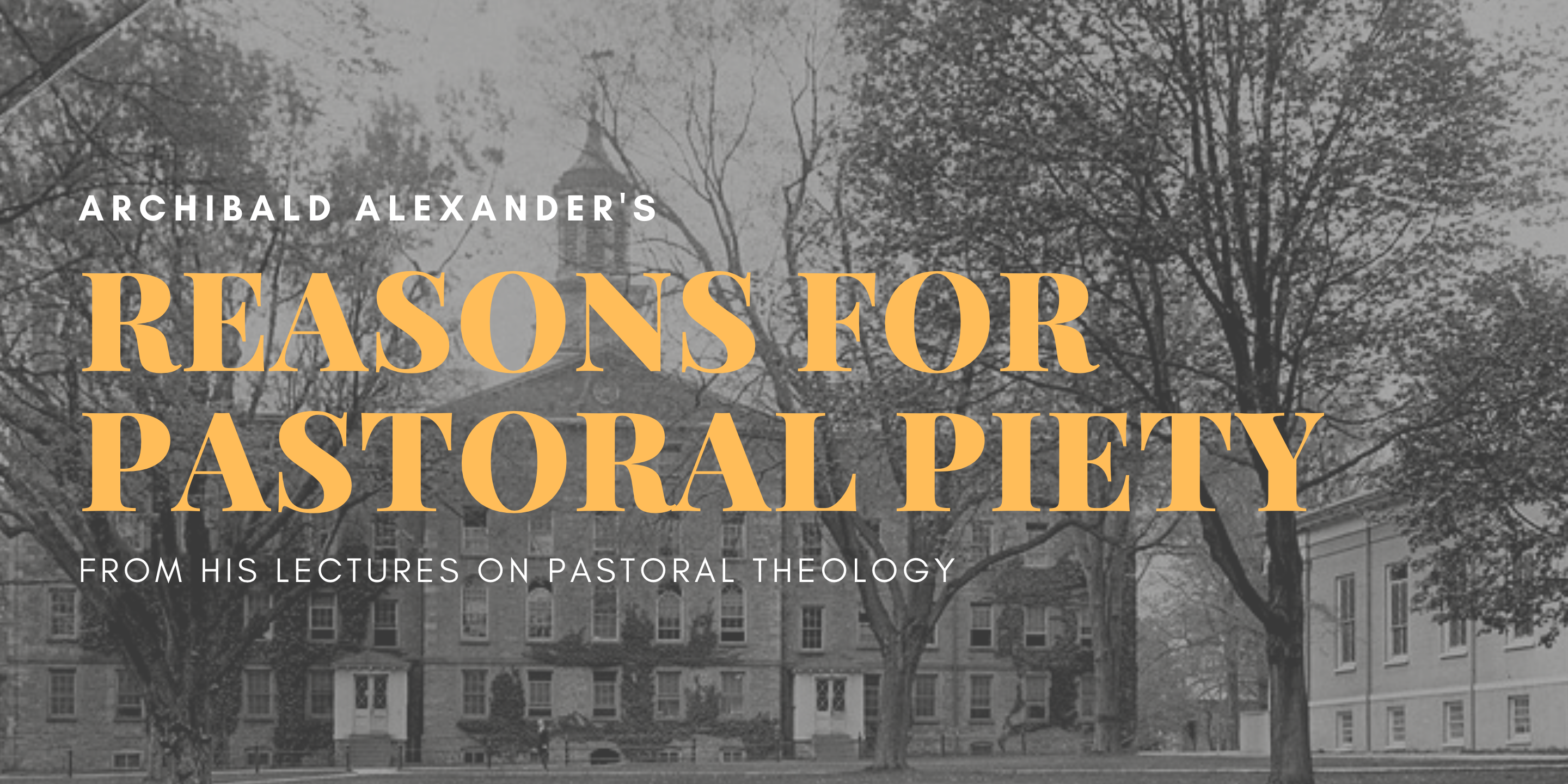
This semester, I’m teaching a course on preaching at RTS-Dallas. One of the required textbooks is James Garretson’s Princeton and Preaching: Archibald Alexander and The Christian Ministry. The original Princeton men didn’t get everything right, but they got most things right—especially the accent on “vital piety” in ministry. The mandate for personal holiness is all but absent from popular, pastoral discourse these days. If the trend goes unchecked, a ministry of power will be hard to find. I pray the Lord would revive us in ministerial godliness being a chief delight and ambition. It’s why my class begins with a few hours worth of attention to the need for Christ’s preacher to be “a man of God.”
A Nursey of Vital Piety
Samuel Miller famously declared that Princeton Seminary must be “a nursery of vital piety as well as of sound theological learning, and to train up persons for the ministry who shall be lovers as well as defenders of truth as it is in Jesus, friends of revivals of religion, and a blessing to the Church of God.” It was not enough to train students in original languages. Yes, they needed to know Francis Turretin’s definitive and distinctive work. And it surely wasn’t a bad thing that your average student knew how to exegete Scripture in any season. But the founders knew that the Presbyterian church would suffer if her students didn’t expand their hearts’ love for Christ.
So, they pled for personal holiness.
14 Reasons Why It’s Needed
You need only scan the essential writing from the Princeton professors to see how universal was this concern. In one of his pastoral lectures, Archibald Alexander gave fourteen reasons why students should train themselves for godliness.
- Some degree of eminence is requisite for our own satisfaction.
- The work is so great and sacred, and the consequences so awful, that none will duly feel and act under the responsibilities of the office, but one whose heart is warmed with fervent love to Christ and the souls of men.
- The duties of the ministry will never be faithfully performed by any one but he who is deeply under the influence of divine truth. He will become indolent and careless or will sink into discouragement—or will become entangled with worldly engagements.
- He will not be able to converse with edification to the people without this.
- It is necessary to preserve the minister from ambition and vain glory.
- Necessary to make him to speak with confidence of the excellency and comforts of true piety.
- Eminent piety is requisite to enable a minister to compose sermons induced with the right spirit. To feed the devotions of the people, etc.
- Without a good degree of eminence in piety, the minister’s example will not be savory and consistent. It is necessary to preserve him from sin. He should be higher than all the people in spiritual attainments.
- It will greatly increase his influenc.e
- Will enable him to bear with patience the persecution of enemies.
- It will be better than all rules of rhetoric in the delivery of sermons.
- It will make the work of ministry delightful.
- Will prepare for sickness and death.
- Eminent piety will diffuse a solemn seriousness, over the manners. Gravity, composure of countenance—dignity of demeanor—propriety in every word, look and gesture.
Essential for Faithfulness
As Garretson comments, “Christian graces were essential if men were to prove to be faithful servants of Christ. Fidelity, humility, self-denial, diligence, temperance, and a ‘habitual concern for the welfare of the Church’—these were among the marks of ministerial godliness that would result in a ministry owned and blessed by God.”
Condemnation is Easier than Consolation
“A sustaining ministry, a gospel ministry, requires more thought more study, more insight than a condemning ministry. A finger-pointing ministry is easy. Moralism is the default setting of our minds. But it takes divine wisdom to understand God’s grace in a new way, so we can sustain weary people. Jesus gave himself fully to that ministry.”
— Ray Ortlund, Isaiah: God Saves Sinners, 355.
Publishing Update: A Legacy of Preaching
Hot off the press today is volume two of Zondervan’s A Legacy of Preaching, which is subtitled, “Enlightenment to the Present Day: The Life, Theology, and Method of History’s Great Preachers.”
I wrote the chapter on Robert Murray M’Cheyne’s preaching. My primary editor, Benjamin Forrest, was a joy to work with; I’m pleased with the chapter’s final form. I hope you’ll grab a copy! All the other chapters I’ve seen are edifying and informative.
Publisher’s Description
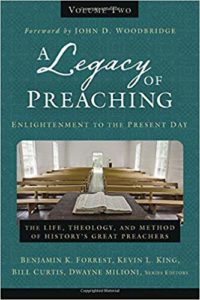 A Legacy of Preaching, Volume Two–Enlightenment to the Present Day explores the history and development of preaching through a biographical and theological examination of its most important preachers. Instead of teaching the history of preaching from the perspective of movements and eras, each contributor tells the story of a particular preacher in history, allowing these preachers from the past to come alive and instruct us through their lives, theologies, and methods of preaching.
A Legacy of Preaching, Volume Two–Enlightenment to the Present Day explores the history and development of preaching through a biographical and theological examination of its most important preachers. Instead of teaching the history of preaching from the perspective of movements and eras, each contributor tells the story of a particular preacher in history, allowing these preachers from the past to come alive and instruct us through their lives, theologies, and methods of preaching.
Each chapter introduces readers to a key figure in the history of preaching, followed by an analysis of the theological views that shaped their preaching, their methodology of sermon preparation and delivery, and an appraisal of the significant contributions they have made to the history of preaching. This diverse collection of familiar and lesser-known individuals provides a detailed and fascinating look at what it has meant to communicate the gospel over the past two thousand years. By looking at how the gospel has been communicated over time and across different cultures, pastors, scholars, and homiletics students can enrich their own understanding and practice of preaching for application today.
Volume Two covers the period from the Enlightenment to the present day and profiles thirty-one preachers including Charles Haddon Spurgeon, D. L. Moody, Billy Sunday, Karl Barth, D. Martyn Lloyd-Jones, John Stott, Harry Emerson Fosdick, Martin Luther King Jr., Billy Graham, and more.
Volume One, available separately, covers the period from the apostles to the Puritans and profiles thirty preachers including Paul, Origen of Alexandria, Augustine of Hippo, Francis of Assisi, Martin Luther, Jonathan Edwards, John Wesley, George Whitefield, and more.
Covering a broad range of preaching over the centuries, the two-volume A Legacy of Preaching reference set is the definitive reference for experienced preachers who wish to deeper their own preaching as well as aspiring students who want to learn from the masters of the past.
Perils in Pastoral Ministry

Sunday’s coming. The Lord’s Day is on the way. And Christ’s preachers must be ready. We must gird up the loins, go, and proclaim Christ from behind the sacred desk.
It’s my regular practice to spend time every Friday and Saturday reading something that stirs my soul for Christ and for preaching His beauty. Today it was a chapter from J. W. Jowett’s book, The Preacher: His Life and Work. The selection is titled “The Perils of the Preacher.”
Before I summarize them, let’s get to know the old man a bit.
A Grave Preacher
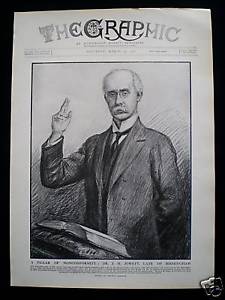 After hearing the great Dr. Fairbairn preach, Jowett told his students at Airedale College, “Gentlemen, I will tell you what I have observed this morning: behind that sermon there was a man.” Although The Preacher provides scant autobiographical information, I always have same sense in reading Jowett’s work—there is gravity in his message.
After hearing the great Dr. Fairbairn preach, Jowett told his students at Airedale College, “Gentlemen, I will tell you what I have observed this morning: behind that sermon there was a man.” Although The Preacher provides scant autobiographical information, I always have same sense in reading Jowett’s work—there is gravity in his message.
Jowett was born in 1863 in Halifax, West Yorkshire. Like many great ministers before him, Jowett initially resolved to study law. God soon called him into the gospel ministry. He went on to train at Edinburgh and Oxford before assuming his first pastoral position at St. James Church in Newcastle-upon-Tyne. The church held over 1,000 seats, and none were empty during Jowett’s ministry.
In 1911 he became the pastor at Fifth Avenue Presbyterian Church in New York. John Bishop says,
The church was crowded long before the hour of Jowett’s first service. Reporters crowded the side galleries, expecting to find a sensational preacher with dazzling oratory and catchy sermon topics on current events. Instead they found a shy, quiet little man, bald-headed and with a cropped white moustache, who spoke in a calm, simple manner.
He was at Fifth Avenue when he delivered the Lyman Beecher lectures on a pastor’s life and ministry. He stayed in New York until 1918 when he was called to succeed G. Campbell Morgan at Westminster Chapel in London. It was his last pastoral post, as he died in 1923.
The Preacher’s Perils
So, then, what are some common perils threatening pastors? Jowett mentions four.
- Deadening familiarity with the sublime. “I think this is one of the most insidious, and perhaps the predominant peril in a preacher’s life. A man my live in mountain country, and lose all sense of the heights. . . . The preacher lives almost every hour in sight of the immensities and the eternities—the awful sovereignty of God, and the glorious, yet cloud-capped mysteries of redeeming grace. But here is the possible tragedy: he may live in constant sight of these tremendous presences and may cease to see them.”
- Deadening familiarity with the commonplace. “There is an equally subtle peril of our becoming dead to the bleeding tragedies of common life.” Jowett mentions several things, but focuses mostly on a deadened sense of the tragedy of death. “Familiarity may be deadly, and we may be dead men in the usually disturbing presences of sorrow, and pain, and death. The pathetic may cease to melt us, the tragic may cease to shock us. We may lose our power to weep.”
- Possible perversion of our emotional life. “The preaching of the Gospel of the Lord Jesus Christ demands and creates in the preacher a certain power worthy of emotion, and this very emotion becomes the center of new ministerial danger. . . . That is to say, the evangelical preacher, with his constant business in great facts and verities that sway the feelings, may become the victim of nervous depression, and in his nervous impoverishment his moral defences may be relaxed, the enemy may leap within his gates, and his spirit may be imprisoned in dark and carnal bondage.”
- The perilous gravitation of the world. “I say you meet that danger everywhere, but nowhere will you meet it in a more insidious and persistent fashion that in the Christian ministry. [Worldliness] is round about us like a malaria, and we may become susceptible to its contagion.” “In the perilous gravitation of worldliness there is more than an illicit spirit of compromise: there is what I will call the fascination of the glittering.” “We may become more intent on full pews than on redeemed souls.“
Jowett’s remedy to such pitfalls is proper: a renewed commitment to Christ through the means of grace. “We must,” Jowett declares, “assiduously attend to the culture of our souls. We must sternly and systematically make time for prayer, and for the devotional reading of the Word of God. We must appoint private seasons for the deliberate and personal appropriation of the Divine Word, for self-examination.”
Brothers of the pulpit, if we do not take heed of our doctrine and practice, we will fall into a perilous condition. And Jowett warns what that will mean:
Our characters will lose their spirituality. We shall lack that fine fragrance which makes people know that we dwell in ‘the King’s gardens.’ There will be no heavenly air about our spirits. . . . We are wordy, but not mighty. We are eloquent, but do not persuade. We are reasonable, but we do not convince. We preach much, but we accomplish little. We teach, but we do not woo. We make a ‘show of power,’ but men do not move.
Persevere in the Precious

Over the last month, Jeremiah has been one of the four books in my Bible reading plan. Jeremiah’s ministry has long captivated my attention and affection. I think it’s because there are some pronounced similarities between his life and mine (and many more dissimilarities, of course). There was a magnificent and undeniable call to the ministry. Big dreams and ambitions flowed from the start. But over the years, the disappointments quickly come to outweigh the delights. There’s also an introspective nature that can cause us to forget the Lord’s work.
How true it is that an inward-looking Spirit can rob one of joy in God’s service.
A Groaning Conscience
I’ve long thought that Spurgeon was something like a modern-era Jeremiah. He knew great highs in ministry, but melancholy was a most-familiar friend. One would assume that the “Prince of Preachers” stepped down from the sacred desk each with glad confidence, but his experience was different. He once said of his world-famous preaching ministry, “It is a long time since I preached a sermon I was satisfied with. You cannot hear my groanings when I go home, Sunday after Sunday, and wish that I could learn to preach somehow or other; wish that I could discover the way to touch your hearts and your consciences.” If you are anything like me, you offer a weary, “Hear, hear,” to such sentiment.
What then are we to do in such a situation? How might we respond when the demands of ministry are like a wet blanket on joy in Christ? We find an answer in one scene from the life of Jeremiah—especially one verse: Jeremiah 15:18.
When Ministry Breaks Your Heart
Let’s remember the context. Jeremiah had reluctantly taken up God’s commission to be His mouthpiece around 627 BC, about five years before King Josiah’s famous reforms. There are two overarching matters worth remembering about his prophetic ministry:
- It’s length. The book represents Jeremiah’s forty-plus years in the Lord’s service. The words we find in chapter 15 are not the words of a novice. They are the soul-cries of a man who has ministered for around twenty years.
- It’s difficulty. Jeremiah is known as “The Weeping Prophet” for a reason. He experienced the siege and fall of Jerusalem, and Judah’s subsequent exile. He knew profound opposition, discouragement, and affliction.
It’s the second point that I want to meditate. In Jeremiah 15, we find the prophet entering what is likely his third decade of ministry. And he’s discouraged. He’s asked if there is any hope for Judah (14:19). He’s pained by the Lord’s subsequent promise of unrelenting judgment upon Judah in 15:1–9, and so he complains to the Lord in 15:10–18. Jeremiah recalls the original delight of his ordination, so much so that he says in 15:16, “Your words were found, and I ate them, and your words became to me a joy and the delight of my heart, for I am called by your name, O Lord, God of hosts.”
Years of toil and trouble had taken such delight, however. Jeremiah was so pained in ministry that he goes so far to accuse God of having deceived him (15:18). Ministerial sorrows cannot only rob the pastor of joy but can also remove his hope.
How God Breaks Our Complaints
For weeks now, I’ve meditated on 15:19, which represents God’s answer to Jeremiah’s ministerial complaint. Notice what God says, “If you return, I will restore you, and you shall stand before me. If you utter what is precious, and not what is worthless, you shall be as my mouth. They shall turn to you, but you shall not turn to them.”
When God calls us to the gospel ministry, He calls us to an office full of difficulty. Sometimes that difficulty is bearing the burden of grief, as church members suffer and pass on to glory. Sometimes the challenge is unrepentant sinners whose iniquity poisons the body. Sometimes the difficulty is obstinate sheep who continuously demand a surprising amount of attention. Other times it’s the difficulty of constant criticism. These are all in addition to the regular disappointments we encounter: apathy toward the means of grace, complacency toward Christ, and the continual struggle for unity.
The Enemy will tempt us to respond to such difficulty with many sins, perhaps none more consistent than anger and self-pity. Anger looks outward in sin. Self-pity looks inward in sin. Jeremiah commits both trespasses in chapter 15.
Let’s notice two things about 15:19. First, notice the conditions: “If you return . . . If you utter what is precious.” The answer to Jeremiah’s despair that has resulted in anger and self-pity is repentance and renewed obedience. Pastor, could it be that you need to hear the same conditions today? Are you on the brink of preaching this coming Lord’s Day with a spirit of anger or wounded complaint?
Second, notice the promises: “. . . you shall stand before me . . . you shall be as my mouth.” The first promise is one of God’s presence, while the second assures God’s minister of power. What kindnesses from the King!
If we are to minister Christ’s gospel to His people and our community, we will need God’s presence and power—we will need God’s Spirit. According to this text, a Spirit-wrought ministry is one that thrives on repentance and obedience.
A Precious Ministry
One of the greatest preachers of the nineteenth century was Octavius Winslow. He was full of Christ and experiential wisdom. When Spurgeon’s Metropolitan Tabernacle opened in 1861 none other than Winslow was found preaching behind its pulpit. His most famous work is probably the volume, The Precious Things of God. In it, Winslow meditates on twelve topics the Scriptures declare to be precious:
- The Preciousness of Christ
- The Preciousness of Faith
- The Preciousness of Trial
- The Preciousness of God’s Thoughts
- The Preciousness of the Divine Promises
- The Preciousness of Christ’s Blood
- The Precious Anointing
- The Preciousness of God’s Children
- The Preciousness of God’s Word
- The Preciousness of Prayer
- The Preciousness of Christ’s Sympathy with our Infirmities
- The Death of the Saints Precious
Do these twelve precious things of God saturate your preaching and pastoring?
God tells Jeremiah to “utter what is precious.” The prophet must take out the vile and worthless complaints from his mouth, iso thathe might be once again God’s mouthpiece. Oh, how convicting this is to me. My capability to complain too often drowns my delight in Christ. May the sweet nectar of God’s preciousness be my drink more than the bitter dregs of anger and self-pity.
May the Lord help us all to be faithful ministers of that which is precious.
A Subtle and Dangerous Snare

If we are ever to see a revival in our nation, it will begin with a revival of real gospel ministry. Pastoral paradigms built on pragmatism must fall, and in their place, we will see a renewed passion for prayer and piety. The kind of preaching that the Spirit blesses (and the heraldic ministry that ushers in revival) is that which is saturated in prayer and comes from the mouth of a man consumed with holy love for Christ. Before he ever considers strategic vision, administrative planning, and staffing structure, God’s man must be a man of God—in doctrine and devotion.
Should God grant me many years in ministry, I want to see this kind of renewal visit our ministers. But such a renewal comes with a perennial peril.
Learning a Vital Lesson
As I’ve studied Robert Murray M’Cheyne over the last few years, one of the more noticeable lessons his life teaches is the full-orbed nature of pastoral piety. We need to understand this totality of holiness in two ways. First, for M’Cheyne, piety begins with love for Christ. It then flowers into every area of spirituality: devotion to prayer, God’s Word, the Lord’s Day, evangelism, friendship in the church, dependence on the Spirit, and “unfeigned humility.” Secondly, we must see that an earnest pursuit of piety is a dangerous one. We can make much of godliness—it’s necessity and nature—that people overestimate our actual holiness. It’s one thing to be a holy man, but it’s entirely different to be known, even famed, for holiness.
M’Cheyne was such a minister.
The Snare Exposed
M’Cheyne once wrote, “I earnestly long for more grace and personal holiness, and more usefulness.” Nothing communicates M’Cheyne’s longing more than his Reformation.
Written in late 1842 or early 1843, it is his ten-page resolution for personal holiness. In the first section, he concentrated on “Personal Reformation,” saying,
I am persuaded that I shall obtain the highest amount of present happiness, I shall do most for God’s glory and the good of man, and I shall have the fullest reward in eternity, by maintaining a conscience always washed in Christ’s blood, by being filled with the Holy Spirit at all times, and by attaining the most entire likeness to Christ in mind, will, and heart, that it is possible for a redeemed sinner to attain to in this world.
M’Cheyne proceeded to delineate a scheme for personal holiness that would enable him to live in increasing communion with Christ. The plan included strategies for confessing sin, reading Scripture, applying Christ to the conscience, being filled with the Spirit, growing in humility, fleeing temptation, meditating on heaven, as well as studying specific Christological subjects.
His devotion to Christ was so renown that almost every epigram after his death referred to him as “the saintly ministry” or “the godly pastor” of St. Peter’s. His friend and biographer, Andrew Bonar, made an astute observation on a common pitfall in pastoral piety:
An experienced servant of God has said, that, while popularity is a snare that few are not caught by, a more subtle and dangerous snare is to be famed for holiness. The fame of being a godly man is a great a snare as the fame of being learned or eloquent. It is possible to attend with scrupulous anxiety even to secret habits of devotion, in order to get a name for holiness. If any were exposed to this snare in his day, Mr. M’Cheyne was the person. Yet nothing was more certain than that, to the very last, he was ever discovering, and successfully resisting, the deceitful tendencies of his own heart, and a tempting devil. Two things he seems never to have ceased from—the cultivation of personal holiness, and the most anxious efforts to save souls.
Examine Yourself
Ever since I first read it, these two sentences in the quote above have been a constant warning: “The fame of being a godly man is a great a snare as the fame of being learned or eloquent. It is possible to attend with scrupulous anxiety even to secret habits of devotion, in order to get a name for holiness.”
I’m not known as a holy man. But I recognize how easy it is to devote oneself to the means of grace and forget that your real motivation is selfish to the core: “I make much of such devotion so people will make much of my devotion.” Thus, the pastor’s pursuit is only in service of self, not the Savior. The Spirit won’t revive His church with such a man.
Pastors then must be wary of their motives in pursuing piety. They must resist the praise of men, and live only for the smiles of God. They must recognize how the devil schemes, even in our noble endeavors, and live for Christ’s honor alone.
True holiness is noticeable. Vital godliness leaves a mark. Paul’s teaching to Timothy demands it: “Practice these things, immerse yourself in them, so that all may see your progress. Keep a close watch on yourself and on the teaching. Persist in this, for by so doing you will save both yourself and your hearers” (1 Tim. 4:15–16).
So, yes, let’s pursue personal holiness with extraordinary vigor. But test your motives. Make sure they aren’t, at the root, just a scheme “to get a name for holiness.”
Danger Lurks Near The Sacred Desk

Temptations fly at preachers as mosquitos swarm in a swamp. Archibald Alexander knew this well. To read his teachings on pastoral ministry is to read not only expert wisdom, but also experienced wisdom. No novice teacher can pen the paragraphs below.
The pulpit is perhaps, the severest ordeal of piety in the world. The man in secret might have felt humbled, on account of his sins, and seriously concerned for the salvation of his fellowmen; but when he rises in the pulpit, and hundreds of eyes are fixed on him, and multitudes are observing his performance, he can with difficult avoid feeling his attention drawn to himself, and a strong desire to acquit himself as to meet public expectation, and at any rate to rise above contempt.
And if a man has acquired already some degree of popularity, he naturally feels a strong desire to preserve the reputation which he has acquired. And these thoughts relating to his own dear popularity, may so get possession of his mind, that with every word which he utters, and every gesture which he makes, the thought may involuntarily occur, ‘How will this be received?’ Or, perhaps, in a form more hateful, ‘that is well spoken’—’that will be admired’—or ‘that will instruct the audience.’
And if he preaches with liberty, and some degree of eloquence, self-complacency is apt to arise in the mind. The deceitfulness and deep depravity of the human heart, never appears more evidently than in the pulpit. If all the thoughts which pass thro’ the preachers mind were exposed in their naked deformity to the view of the people, how would he be ashamed and confounded!
May the Lord enable His preachers to know true humility and vital piety in the pulpit. May the Lord protect us from seeking man’s praise. May He give us hearts that long to proclaim Christ alone.
